
David Roy Eldridge, nicknamed "Little Jazz", was an American jazz trumpeter. His sophisticated use of harmony, including the use of tritone substitutions, his virtuosic solos exhibiting a departure from the dominant style of jazz trumpet innovator Louis Armstrong, and his strong impact on Dizzy Gillespie mark him as one of the most influential musicians of the swing era and a precursor of bebop.

Coleman Randolph Hawkins, nicknamed "Hawk" and sometimes "Bean", was an American jazz tenor saxophonist. One of the first prominent jazz musicians on his instrument, as Joachim E. Berendt explained: "there were some tenor players before him, but the instrument was not an acknowledged jazz horn". Hawkins biographer John Chilton described the prevalent styles of tenor saxophone solos prior to Hawkins as "mooing" and "rubbery belches". Hawkins denied being first and noted his contemporaries Happy Caldwell, Stump Evans, and Prince Robinson, although he was the first to tailor his method of improvisation to the saxophone rather than imitate the techniques of the clarinet. Hawkins' virtuosic, arpeggiated approach to improvisation, with his characteristic rich, emotional, and vibrato-laden tonal style, was the main influence on a generation of tenor players that included Chu Berry, Charlie Barnet, Tex Beneke, Ben Webster, Vido Musso, Herschel Evans, Buddy Tate, and Don Byas, and through them the later tenormen, Arnett Cobb, Illinois Jacquet, Flip Phillips, Ike Quebec, Al Sears, Paul Gonsalves, and Lucky Thompson. While Hawkins became known with swing music during the big band era, he had a role in the development of bebop in the 1940s.

Harry "Sweets" Edison was an American jazz trumpeter and a member of the Count Basie Orchestra. His most important contribution was as a Hollywood studio musician, whose muted trumpet can be heard backing singers, most notably Frank Sinatra.

Benjamin Francis Webster was an American jazz tenor saxophonist.
Discography for jazz double-bassist and cellist Ray Brown.
Victor Dickenson was an American jazz trombonist. His career began in the 1920s and continued through musical partnerships with Count Basie (1940–41), Sidney Bechet (1941), and Earl Hines.

Albert J. "Budd" Johnson III was an American jazz saxophonist and clarinetist who worked extensively with, among others, Ben Webster, Benny Goodman, Big Joe Turner, Coleman Hawkins, Dizzy Gillespie, Duke Ellington, Quincy Jones, Count Basie, Billie Holiday and, especially, Earl Hines.
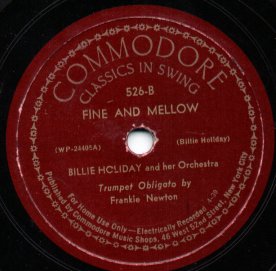
"Fine and Mellow" is a jazz standard written by Billie Holiday, who first recorded it on April 20, 1939 on the Commodore label. It is a blues lamenting the bad treatment of a woman at the hands of "my man".

Although it is billed as a Duke Ellington and Johnny Hodges album, Side by Side is a 1959 album mostly under the leadership of Johnny Hodges, Duke Ellington's alto saxophonist for many years. Ellington only appears on three of this album's tracks. The album places Hodges at the fore, backing him with piano by Ellington or Billy Strayhorn and providing other accompaniment by jazz figures like Ben Webster, Roy Eldridge, Harry "Sweets" Edison and Jo Jones. The album, a follow-up to Back to Back: Duke Ellington and Johnny Hodges Play the Blues, has remained perpetually in print.
"In a Mellow Tone", also known as "In a Mellotone", is a 1939 jazz standard composed by Duke Ellington, with lyrics written by Milt Gabler. The song was based on the 1917 standard "Rose Room" by Art Hickman and Harry Williams, which Ellington himself had recorded in 1932. Howard Stern used a recording of this song as the opening theme to The Howard Stern Show from 1987 to 1994.

Gerry Mulligan Meets Ben Webster, also simply called Meets Ben Webster, is a 1960 album featuring the November 3 - December 2 studio sessions of American jazz musicians Gerry Mulligan and Ben Webster. In a 2003 review, All That Jazz described this album as the most significant of Gerry Mulligan's work partnering other legendary figures of jazz. The album, as a "classic album from two giants", is featured in NPR's "Basic Jazz Record Library". Originally released on the Verve label, the album was reissued by the label many times (as well as by Mobile Fidelity) before being re-released in an expanded edition called Gerry Mulligan Meets Ben Webster (Complete) by Verve in 1997.
Alvin Stoller was an American jazz drummer. Though he seems to have been largely forgotten, he was held in high regard in the 1940s and 1950s. He was best known for playing drums on both Mitch Miller's recording of "The Yellow Rose of Texas" and Stan Freberg's parody of Miller's recording.
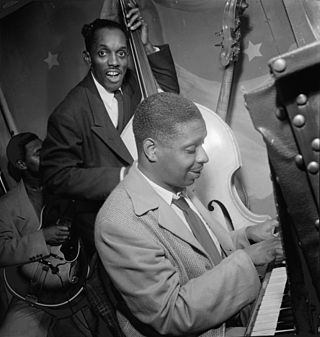
James Henry Jones was an American jazz pianist and arranger.

See You at the Fair is an album by jazz saxophonist Ben Webster, released by Impulse! Records.
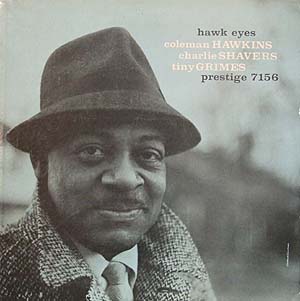
Hawk Eyes is an album by saxophonist Coleman Hawkins which was recorded in 1959 and released on the Prestige label.
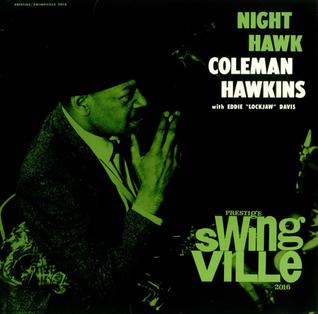
Night Hawk is an album by saxophonists Coleman Hawkins with Eddie "Lockjaw" Davis, recorded at the end of 1960 and released on the Swingville label.
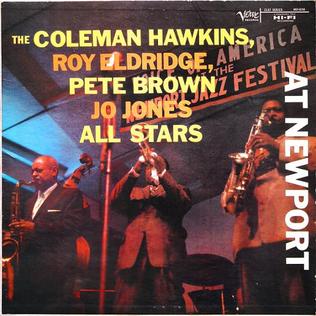
The Coleman Hawkins, Roy Eldridge, Pete Brown, Jo Jones All Stars at Newport is a live album by Coleman Hawkins's All Stars with Roy Eldridge, Pete Brown and Jo Jones recorded at the Newport Jazz Festival in 1957 and released on the Verve label.

Coleman Hawkins and Confrères is an album by saxophonist Coleman Hawkins which was recorded in 1958 and released on the Verve label.

Hawkins! Eldridge! Hodges! Alive! At the Village Gate! is a live album by saxophonists Coleman Hawkins and Johnny Hodges with trumpeter Roy Eldridge which was recorded at the Village Gate in 1962 and released on the Verve label.

Rainbow Mist is an album by the American jazz saxophonist Coleman Hawkins compiling recordings from 1944 originally released by Apollo Records that was released by the Delmark label in 1992.
















